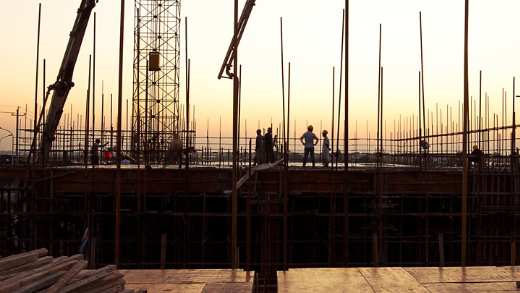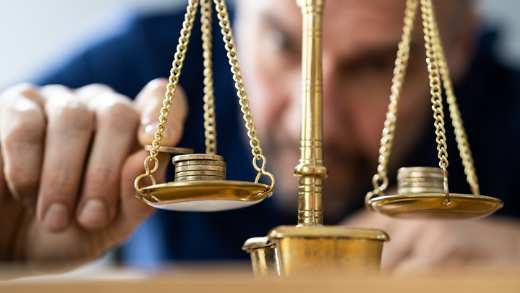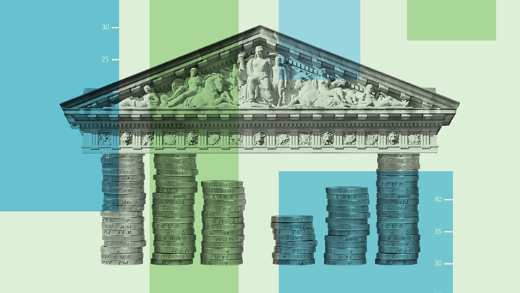The prominent climate change campaigner and founder of green energy supplier Ecotricity discusses biogas, the energy crisis and the need for a shake-up in government policy to achieve net zero in a wide-ranging interview with AIQ. Words by Miles Costello.
On the day Dale Vince held a conversation with AIQ, a group of environmental protestors was busy bringing parts of the M25 motorway around London to a shuddering standstill for a second time.
There is an increased willingness among campaigners to take combatting the climate emergency into their own hands
The group, Insulate Britain, has been calling on the UK government to provide funding to install emissions-reducing insulation in every home by 2030 and its members were prepared to be arrested – plenty have been – to highlight their cause. The disruptions – angry motorists stuck in miles-long tailbacks complaining about lengthy delays – mark the latest example of an increased willingness among campaigners to take combatting the climate emergency into their own hands.
Go back a few decades and Vince might well have joined them as their action spread to the M11 in Essex and the M3 in Surrey. But not now. The former new age traveller and life-long environmental crusader has chosen other ways to promote the green agenda.
“I see both sides,” he says, speaking to AIQ via Zoom from Gloucestershire, where he lives and works, with the distinctive green, white and black flag of his company Ecotricity on the wall behind him.
When you protest, you tread this fine line between upsetting people and getting something done
“I see what they’re saying about inconvenience, but I also see what these people are saying about the climate crisis, which is real. When you protest, you tread this fine line between upsetting people and getting something done, creating attention and focusing on the problem. If it was left to me, I wouldn’t do it. I’m not saying that they shouldn’t do it. I’m just not sure it’s the best use of my time. I’m in a place where I can probably have more influence by the things I write and the things I say.”
Vince does a lot of that, with a column in the Daily Express, regular appearances on the BBC and a parade of blogs and commentary – on issues from spiking gas prices and collapsing energy companies, to billionaires, including Sir Richard Branson, ploughing their fortunes into space exploration.
Actions and words
For Vince, what he does is equally, if not more, important than what he says; there’s plenty of that too and most of it involves firsts. This former restless wanderer who once lived and travelled in a converted fire engine now owns and runs Ecotricity, the UK’s first renewable energy company.
Ecotricity embraces numerous sustainable energy sources and practices
His group embraces numerous sustainable energy sources and practices, including wind, solar, battery storage and biogas, generating electricity and gas for several hundred thousand households and businesses.
He is also the chairman and owner of Forest Green Rovers, a football team powered by solar heat and light and a vegan diet, who, at time of writing, are flying high at the top of English Football League Two.
Along the way, Vince and his team developed and built the UK’s first electric performance car, the Nemesis, and then installed a nationwide network of charging points – through a company called Electric Highway – that initially provided its recharging facilities for free. Vince sold the business earlier this year to clean energy group Gridserve “for a sum I’m not allowed to talk about”.
As part of his ambition to take the “boring” out of electric travel, nine years ago the Nemesis surged to a top speed of 151mph (243km/h) at an airfield in North Yorkshire, claiming the land speed record for an electric vehicle in the UK. And his most recent project is ‘sky diamonds’, using carbon capture technology at a small plant in Stroud to produce an eco-friendly version of the much-loved precious stone.
If all of this – electric sports cars, trophy football club assets – conjures up images of an Elon Musk-like playboy, think again. There’s no bitcoin or space travel, nor runaway ego to be found here; Vince won’t travel on planes let alone rockets, and his life – and business practices – are all avowedly green.
I find it easy to live a sustainable life but my experience is not the same as everybody else
“I can tell you that I find it easy [to live a sustainable life], but my experience is not the same as everybody else. I power my house on green electricity; I’ve got solar panels, a heat pump, LED light bulbs, I recycle, I compost. I drive an electric motorbike to work because I live locally, and I can afford one. And I drive on holiday to Cornwall, because I love Cornwall and I won’t fly. That’s a choice.
“I believe in doing, and at the same time in talking. I don’t believe one or other of those on their own is as impactful. We have to take responsibility for our own actions and if we invest in crap, we should stop doing that and invest in good things. In my time at Ecotricity, I set out first to do what I thought was right. We then reached the point we had done stuff and proven it, and then it was the right time to talk about it: not as an academic or someone who had a theory, but as someone that had been there and done it.”
From small beginnings to new frontiers
Vince’s transformation from a regularly hungry and penniless traveller to a successful ‘green industrialist’, with a paper fortune estimated at more than £100 million, began when he installed a wind turbine on top of an old ambulance he was living in and realised it could generate all his energy needs.
As a business empire, Ecotricity closely resembles a gently purring family saloon
If Ecotricity, which was established in 1995, effectively began life as an old jalopy, as a business empire it now more closely resembles a gently purring family saloon (electric model, naturally). As it stands, the company has the power to generate about 88MW of power via one wind and one solar park – Vince prefers the term park to farm, which he believes evokes the dirt, grime and waste of industry and the abusive processes of livestock and dairy markets.
Yet it is expanding rapidly. Building is underway at two further solar parks that will generate an additional 20MW of power, and it has a string of wind, solar and battery storage projects in the approval or development stage as part of its ambition to add a further 2,000MW to its potential, half of it over the next ten years.
Central to his expansion plans is biogas, or what he calls ‘green gas’. “It’s made from anaerobic digestion. It’s just a plant-based form of methane.” Ecotricity already supplies its customers with green gas produced using anaerobic digestion, but this is imported from the Netherlands. Anaerobic digesters, which in essence break down biodegradable materials and convert them into fuel, can be fed a variety of crops and cereals to churn out their gas, but Ecotricity intends to use grass, a material of which he is particularly fond.
Green gas is a really important new frontier for Britain
Vince’s plan is to build a green gas plant at a site in Reading. Planning approval for the project has been gained and he is hopeful that work on site will begin within the coming months. “Green gas is a really important new frontier for Britain. We’ve been lobbying for years about the potential of it to solve the problem, the decarbonisation of heat challenge, which basically means how we get off fossil gas,” he explains.
“The government is now talking about heat pumps and hydrogen economies; those are just incredibly expensive missteps when green gas is right underneath our feet and the gas grid we have can cope with it. We have done all our deals with the landowners and the local farmers, for the feedstock and that kind of thing. We’ve got the technology lined up; funders lined up. We’re getting ready to make a start on the ground, hopefully next year, as in digging and making holes and stuff like that. By this time next year, hopefully it’ll be running.”
Good times
This is real stuff. Ecotricity argues the UK has enough marginal grassland at its disposal to generate power for every household, and that Britain could end its reliance on imported energy within the next decade if it pursues the process. Intriguingly, and perhaps in a hint of his underlying entrepreneurial streak, Ecotricity is also trying to expand its footprint by buying its smaller, quoted rival Good Energy, recently increasing its offer to 400 pence a share, which values its target at £66.6 million. Ecotricity already has a 25.1 per cent stake.
We’re trying to buy Good Energy to create a bigger combined power company and to make a difference
“We’re doubling down on green gas; and we’re trying to buy Good Energy to create a bigger combined power company and to make a difference, to help in building 1,000MW in the next ten years. It would give us more scale than we have,” he says.
Buying Good Energy would roughly double the enlarged customer base to more than 400,000. “We have a model we call ‘bills into mills' – we use the revenues from our customers' energy bills to build windmills, sun-mills, gas-mills. The more customers we have, the more we can build.”
Despite the relatively low level of shareholder acceptances for the offer, at roughly 28.2 per cent against the 50 per cent needed, Vince remains confident the deal will get over the line. “It’s too soon for shareholders to be accepting the offer. I don’t look at those numbers and think we’re going to fail.”
We get into stuff that doesn’t look commercial and we don’t care
Vince owns 100 per cent of Ecotricity and he says not having external shareholders is “like a superpower”. “It enables us to do whatever the hell we think is the right thing to do; we get into stuff that doesn’t look commercial and we don’t care – so long as we think it’s the right thing to do. Some years we’ve made losses, but that’s because we’re doing things that other people don’t see the value in. Perhaps they never will.”
Ecotricity has moved in and out of profit over the years depending on how much the company is investing, but its annual turnover is about £300 million, and it is on course to make earnings before interest, tax, depreciation and amortisation (Ebitda) of about £59 million this year. It has £83 million in assets – “so we’re not weak as a company”, Vince says.
Trains, planes and carbon taxes
Although he seems to care little for the trappings of high net worth, Vince’s ownership of Ecotricity does put him personally on the financial hook for a sizeable amount of value. Lest we forget, the energy market is in crisis. Wholesale gas prices have spiked dramatically, sending a string of largely unhedged energy businesses – including Avro Energy, People’s Energy and Green – to the wall.
Companies are finding that the government and regulator-imposed price cap means they are unable to lift their charges
Having initially vacuumed up customers with offers of rock-bottom tariffs, companies are finding that the government and regulator-imposed price cap means they are unable to lift their charges. Also, on the day that Vince and AIQ spoke, UK gas prices were surging by 16 per cent, responding to a toxic combination of rising demand and a heavy shortage in supply and storage capacity.
Vince argues that, while not immune, Ecotricity is stronger than many companies in the sector. Not only does it charge “realistic” prices for its renewable energy, but is 90 per cent hedged for the next 12 months. Crucially, it doesn’t just buy and sell, it builds output. While he believes the current crisis will “shake out”, the structural problems endemic in the energy industry might need a more radical makeover; maybe a bit more of an M25 moment.
Perhaps unsurprisingly, Vince is not short of opinions on the issues. Noting the regulator, Ofgem, is looking at the prevalence of greenwashing in the energy market and a wider government inquiry, he is dismissive of REGOs, or Renewable Energy Guarantee of Origin certificates, arguing they are open to abuse because they can be detached from the underlying power source, diluting green energy provision. He is also doubtful the trading of green energy does much more than transfer resources between providers and customers, solving little of the problem.
We make green energy, and we pay a carbon tax on that green energy – which makes no carbon
More widely, the way carbon offsets and taxes work is a non-starter and defeating for alternative providers such as his own. “Right now, we’re in a place where there is a carbon tax and, guess what, green electricity pays it. If you’re a big industrial user of energy and you use fossil fuels, you don’t pay a carbon tax, you’re exempt. We make green energy, and we pay a carbon tax on that green energy – which makes no carbon.”
“Yes, we may need a carbon tax to change the economic balance, but right now, we’re taxing the good stuff and we’re making free the bad stuff. Flying? There is no fuel duty on flying. Why is that; how does that make sense?”
Vince is not the kind of radical who would seek the grounding of all planes, but he would change the system. “I’d make the airlines pay their fair share, at least a fuel duty. I would take away duty-free goods, because it makes no sense to give people perks to pollute the upper atmosphere. We can suppress demand by making the cost of flying realistic. Right now, it’s cheaper to fly than catch a train, which is madness. It isn’t really cheaper than catching a train; it’s an economic system that’s delivered that for us.”
Think outside the grid
Meanwhile, he happily employs a campaigner’s zeal to his own central ambition, to ensure the national grid is fed 100 per cent by zero-carbon, green energy. It’s perfectly feasible, he claims, arguing solar parks should be capable of generating 80 per cent of the electricity needed to power UK homes and businesses, with sustainable gas, including green hydrogen, making up the remainder.
The unpredictable nature of wind streams and weather patterns means excess power has to be generated
Complicating the picture, the unpredictable nature of wind streams and weather patterns means excess power has to be generated, retained and then fed back into the grid at times of high demand and lower output. Enter battery storage. The key to the success of a power grid supplied entirely by renewable energy lies in the interplay of the three forces of generation, demand and storage.
“Obviously with renewable energy generation you can’t turn it up, but you can turn it down. When there’s too much generation on the grid we can turn our generation down. And you can turn some demand up, you can certainly turn your batteries up and absorb.”
Ecotricity’s first battery project, also in Gloucestershire, should be up and running by around Christmas. As well as storing power, the battery can be used to buy and sell energy to and from the grid. The company also has a virtual power plant, or what Vince calls a ‘smart grid’.
“The smart grid is a piece of software that enables us to control generation, demand and storage. We do it on a minute-by-minute basis and we’re having conversations with large users of energy about which of their loads they could switch off at certain times of the day for half an hour or an hour. There are lots of industrial users that can do that.”
Ecotricity builds individual windmills that provide power directly to local business users
But not all power has to be supplied using the national grid. Ecotricity also builds individual windmills that provide power directly to local business users. These are not small corner convenience stores, though 20 years ago it began making mills that power Sainsbury’s supermarkets.
Among those companies that have used its local mills are Ford at a diesel engine factory that supplied its entire European customer base, Michelin at tyre-making plants, Prudential at a business park in Reading, and B&Q at a distribution centre in Workshop, Nottinghamshire. Ecotricity also developed the UK’s first public sector onsite renewable energy scheme, which powers a hospital in Kings Lynn, Norfolk.
Green football and sky diamonds
That’s not to say Vince’s involvement in any of his other projects is lacking in drive. At Forest Green Rovers, not content with an organic pitch free from pesticides and fertilisers and mown by a solar-powered robot, or a vegan-only cafe for food and drinks, or even a supporters club with its own sustainability representative, Dale has bigger plans.
The club has won planning consent for Eco Park, a 50-hectare development off Junction 13 of the M5 (assuming Insulate Britain hasn’t put up roadblocks). As well as being a football stadium made of wood, Eco Park will feature a green-tech business park supporting 4,000 jobs, as well as a new stretch of canal, wildflower plots and wetlands.
We have to build places to work and places to live, but we can do it in a more sustainable way that leaves room for nature
“It’s a proper sustainable development; we’ll have a 16 per cent biodiversity boost after we’ve built all of this over what it is now. Right now, it’s farmland, and that’s how bad farmland is for the environment. We have to build places to work and places to live; we need those, but we can do it in a more sustainable way that leaves room for nature, and that’s our big message with Eco Park.
“We’ve got planning permission; we’ve got about 30 planning conditions to deal with. We’re maybe a couple of years away from breaking ground, if we’re lucky. We don’t yet know where we’re going to get the money from, so if any pension funds reading this article want to get involved, pick up the phone.”
With Rovers’ eyes firmly on climbing up the football leagues, once complete, Eco Park should have a capacity of 10,000 to 12,000. With the club’s fan base at present around 5,000, Vince says the club “will do clever things” with the seating arrangements to ensure the ground doesn’t feel empty at the beginning. The aim is to make the ground financially as well as environmentally sustainable, so he’s hopeful that it and the business park will pay their way. “That’s our aim, to be sustainable in the broadest sense of the word.”
And sky diamonds; is this sheer indulgence on the part of an entrepreneur who can afford it? Actually, no. Production of the stones involves, literally, extracting carbon from the atmosphere in a process that rather remarkably cleans the air. “We take atmospheric carbon and turn it into diamonds, which is the most permanent form of carbon known to mankind,” Vince says.
It began as a carbon capture concept for me about ten years ago
“It began as a carbon capture concept for me about ten years ago, thinking of different ways to grab carbon from the atmosphere, realising that was only half the battle; what we did with it was just as important. We had to lock it up permanently; and I thought, wow, wouldn’t it be cool if we could make diamonds from it.
“It took seven years of R&D; we launched it last year. Our entire ingredient list is the wind, the sun, the rain. We split it to make hydrogen and atmospheric carbon, that’s it, and the air we put back into the sky is cleaner than the air we take out. It’s the first industrial process to do that. For me, it’s 21st century technology; it’s exciting, it’s evocative, it’s modern alchemy, and it shows people that living a green life isn’t about giving stuff up, it’s just about doing everything differently.”
He admits output of an initial 150 carats a month, rising to 700 to 800 carats if there is enough demand, is modest relative to global annual diamond production of 142 million carats in 2019, before the global pandemic hit last year. But he argues any step to reduce global diamond mining and a production process that takes 4,000 litres of water and half a tonne of greenhouse gas emissions to create one carat has to be a positive one.
Claims and contradictions in the corridors of power
This is, in many ways, the essence of Vince, who talks repeatedly about having embarked on ventures because they were “the right thing to do”, who takes personal and commercial responsibility for his own part in climate change, and who is prepared to speak out and act over his beliefs. He may choose not to be part of the human roadblocks that have halted motorway traffic in recent weeks, but his philosophy seems to share much of the campaigners’ approach.
There have been a number of landmark moments that have begun to tip the scales in favour of the environmentalists’ argument
Vince argues there have been a number of relatively recent landmark moments that have begun to tip the scales in favour of the environmentalists’ argument – the Paris Agreement, Kyoto (which he attended), the increasingly widespread adoption of plant-based foods, electric cars, media interest and campaigns.
“For me, the ultimate tipping point will come when we have a government that doesn’t just set a zero-carbon target, but sets out how we’re going to get there; that changes the economy. The big levers of government - taxes, subsidies and regulations - need to be changed to disfavour fossil fuels and factory farming, the two things driving the climate crisis, and to favour renewable energy and a change in our diets.”
“It’s completely the other way round. We spend more money supporting fossil fuels than renewable energy; we spend more money supporting animal farming than we should. Red beef is VAT free, peanuts are not. Solar panels: 20 per cent VAT; coal, if you want to burn it at home, five per cent VAT. The important bits of our economy, taxes and subsidies, are doing the wrong thing. They’re supporting the wrong way of doing things. When we have a government that just changes that, I think we’ll have that tipping point.”
Using the COVID response template to solve the climate emergency
Although he clearly believes legislation, tax, subsidies and other incentives can play a pivotal role in, at the very least, getting to zero-carbon emissions, he has little faith in the current pace of progress.
I think the UK government are pulling in the wrong direction
“I think the UK government couldn’t be doing less. I think they’re pulling in the wrong direction; allowing a coal mine to be opened in Britain for the first time in 30 years or more; spending £26 billion on roads; allowing a third runway at Heathrow; the expansion of Drax to be the biggest gas-fired power station in Europe; and even subsidising the exploration of further oil and gas in the North Sea, right now in the face of the climate crisis. And, on the other side of the equation, the zero-carbon targets they’ve set. They couldn’t be doing less, actually.”
“Governments don’t tend to lead, they tend to follow; they listen to businesses and to what people want. It’s our job to make them well aware that we want more action on the climate crisis. They have the big levers of power; they could change everything overnight, allowing businesses to do more, people to buy more stuff and change their spending patterns.”
The approaching £400 billion in financial support the UK government provided to contend with the COVID-19 pandemic has shown that money can be found in times of crisis, he says. Shouldn’t climate change be seen as a similar emergency?
We just have to perceive the climate crisis as that kind of existential threat the virus was
“Pre-pandemic, it used to be said by some people that it was too expensive to get to zero carbon. During the pandemic, when we could feel the urgency of the issue, we spent [the equivalent of] more than ten years’ worth of the zero-carbon budget on the economy. We can find the money when we want to; we can drastically change our lives when we want to; we just have to perceive the climate crisis as that kind of existential threat the virus was.
“Too often, the climate crisis is a distant thing in time and in geography. But this year, we’ve seen wildfires in Canada, the US, in Greece, Australia obviously, even in Siberia. The world is burning. We’ve seen floods in Germany, millions of people displaced by flooding in China. We’re having record amounts of rain and heat and dryness and wetness, all at the same time. We can see climate change now, it’s real and it’s happening everywhere.”
Miles Costello is a multi-award-winning writer and journalist.

















